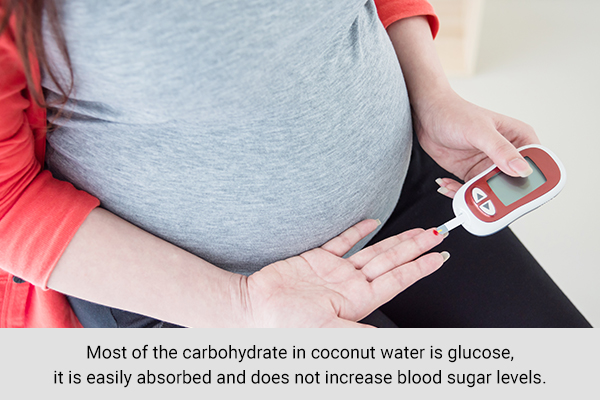In this article:
Coconut is a fruit of the coconut palm that is plant native to the tropical regions of Asia, America, and Africa. (1)

All parts of the coconut are used in its young and mature states for consumption. Coconut water, milk, cream, and dry snacks from grated coconut meat are used for their rich nutritional profile. (1)
Does Coconut Water Raise Blood Sugar in Pregnancy?
Since coconut water contains carbohydrates, it has been reported that it may raise blood sugar levels. But how true is this claim?

Since most of the carbohydrate in coconut water is glucose (a simple sugar), it is easily absorbed and does not increase blood sugar levels. Animal studies have found coconut water to actually reduce blood sugar levels and improve the metabolism of carbohydrates. In addition, it can reduce kidney damage due to diabetes. (2)
In another study, coconut water also reduced HbA1c, which is the amount of glucose in the blood over a long period. (3)
Coconut water was also found to be useful in managing the consequences of a high-fat diet during pregnancy. It also led to an improvement in the total cholesterol level of expecting mothers without raising blood sugar levels. (4)
In conclusion, if you are diabetic or pregnant, you can safely drink coconut water without worrying about it raising your blood sugar levels and you can enjoy its hydrating benefits. Do make sure your coconut water does not have added sugars as these may negate the beneficial effects and cause a rise in blood sugar levels.
Uses of Coconut Water
Coconut water is obtained from the young green fruit and is a rich source of electrolytes.
It contains potassium, sodium, chloride, and carbohydrates and has been successfully used as a replacement for carbohydrate-rich sports beverages that are consumed after an exercise session. (5) It also contains antioxidants that are useful in fighting the damage done by free radicals following intense training/exercise. (5)
Coconut water can also be useful in increasing the daily total fluid intake of pregnant and lactating women. (6) Apart from being a sports beverage, it is also used for oral rehydration and the management of diarrhea, gastroenteritis, and cholera in children. (1)
Expert Recommendation
You can easily consume coconut water as part of your daily diet by using it to make smoothies or adding it to fruit juices. Since the nutritional value of coconut water reduces with heat, avoid using it in soups or cooking.
Most-Asked Questions About Coconut Water
Who should avoid coconut water?

Since coconut water contains high amounts of potassium, people with low potassium levels or those with low blood pressure should not consume coconut water.
How much coconut water can I drink in a day?
You can drink up to 2 glasses of coconut water each day. However, it is best to keep the levels at the lower end.
Is coconut water safe during early pregnancy?
In some regions of the world, coconut water is avoided during early pregnancy with the belief that it may cause miscarriages and difficulty in delivery. (7) However, there is no scientific evidence of it, and it is more of a regional belief than a fact.
If you feel unsure about consuming coconut water while pregnant, consult your doctor or a dietitian.
Final Word
Coconut water is replete with electrolytes that aid in hydration. In many parts of the tropical region where it is grown, coconut water is used for the management of dehydration that accompanies diarrhea, gastroenteritis, and cholera in children. It can be a low-calorie, cool, and refreshing summer drink.
Though coconut water contains carbohydrates, it does not raise blood sugar levels and, on the contrary, can actually protect the kidneys from damage due to high blood sugar levels in diabetes.
- Was this article helpful?
- YES, THANKS!NOT REALLY


